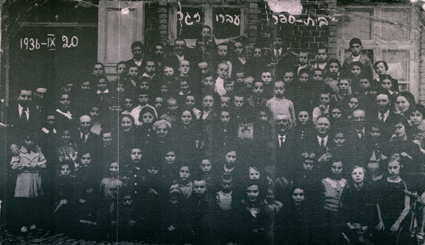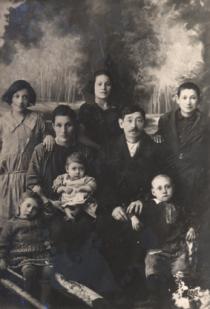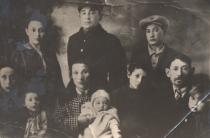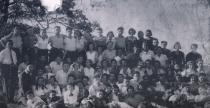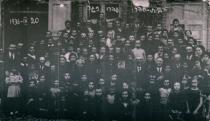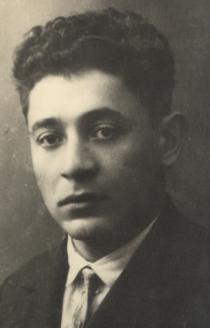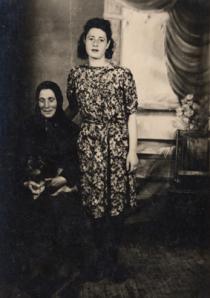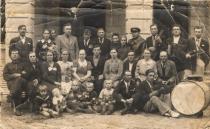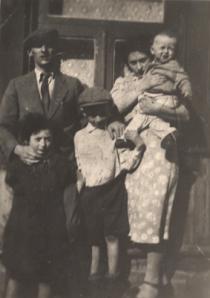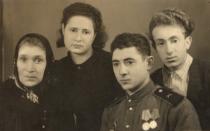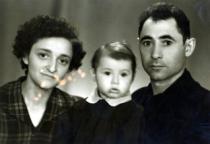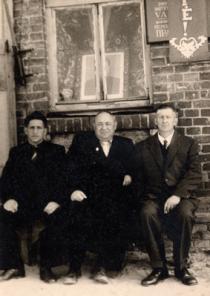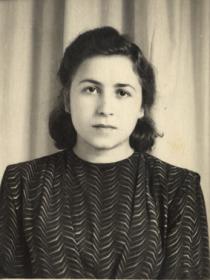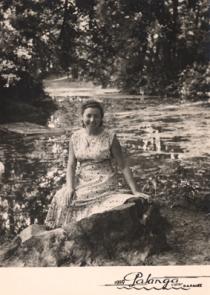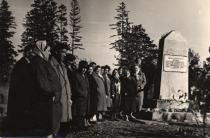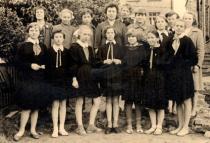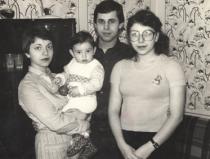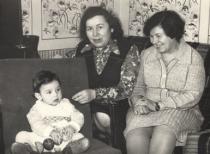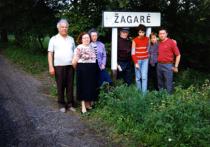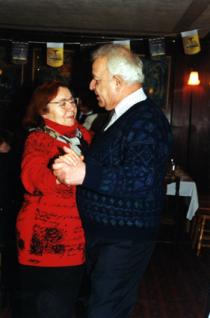These are the students of the newly opened Jewish public school in Zagare. It was founded with the donations from the Jewish community. There is rabbi Riv (with grey beard) in the center. Teacher Gering with her hair parted in the middle is in the 3rd row to the right. My uncle Chaim Beitler is in the 3rd row to the left, then Rochel Beitler. Father's cousin Sheyne Basya is wearing a white sweater. Chana Mere, the daughter of Sheine Basya is to the right in the first row. Teachers Shleiman and Tangu are standing to the left. A man and a woman in the center, the Lemchen, are the sponsors. The picture was made in Zagare on 20 September 1936.
I was born in a Lithuanian town Zagare [about 250 km to the North from Vilnius]. It was a small town bordering on Latvia, with the population of about 5 thousand people. In my childhood, half of town's population were Jews. There were rich, middle-class and poor people. I do not remember any indigent among the Jews in prewar Zagare. All Jewish stores were mostly concentrated in the heart of the town. There were aisles of redbrick houses, where the stores were open. I remember agri store, carrying mostly hardware. There were also manufacture stores and bakeries. There was another hotel in front of Broide's inn. It was owned by a Jew Krits. One of the best apothecaries was in the building of his hotel. Thought, the drugstore was owned by a Lithuanian. There were a lot of photographers in our town. One of the best ones was a Lithuanian. The most famous people of the town were photographed by him. Most of the Jews were workers and craftsmen. There was flax processing factory in town. Some of the craftsmen processed wool there was mill at Svete river. It belonged to the Shruls brothers. They also built a dam, owing to which there was an electricity in town. There two synagogues in Zagare - Nae Zagare ("the New") and Alt Zagare ("the Old"). Alt Zagare were pretty old buildings. They were not acting and gradually got dilapidated. Nae Zagare also were comprised of two buildings- one a daily one and another nice ceremonious looking two-storied building, where people most went on holidays. There was a rabbi in Zagare. His name was Riv. He was a very respectable man. Not only Jews sought his advice, but Lithuanians as well.
In 1939 I went to school. This school was open due to rabbi Riva for sponsors' money, collected from rich Jews of the town. The sponsors were Broide and Strul, my distant relative Vayner, the owner of the store Peretsman. The spouses Lechmen donated the most. They were the manufacturers. There were wonderful teacher Shleiman, Tangu, teacher Geringer. They were wonderful experts and kind people. Unfortunately, all of them died during the occupation of Zagare. I did well at school, especially with the arts. The teaching was in Yiddish, and we spoke it at home as well. That is why I learnt it. At any rate. I still can speak, read and write in Yiddish owning to my classes at that school.
My grandmother's sister Yudesh had a daughter Sheine Basia (married name Yosilovich). She had two daughter and two sons. Elder daughter Yacha was married and her husband was killed in prewar times by Lithuanian anti-Soviets. In late 1950s Yacha left for Israel with her kids and died there in 1990s. The second daughter Chana Mere (married name Miller) lived with her family in Siaulia and died there in 2000. Younger daughter Rochel (married name Kerbelene) got widowed recently. She is currently living in Siaulia. She is a volunteer at the Jewish community. Both of Shene Basua's sons are alive. One of them is living in Vilnius and the other one in Siaulia.
